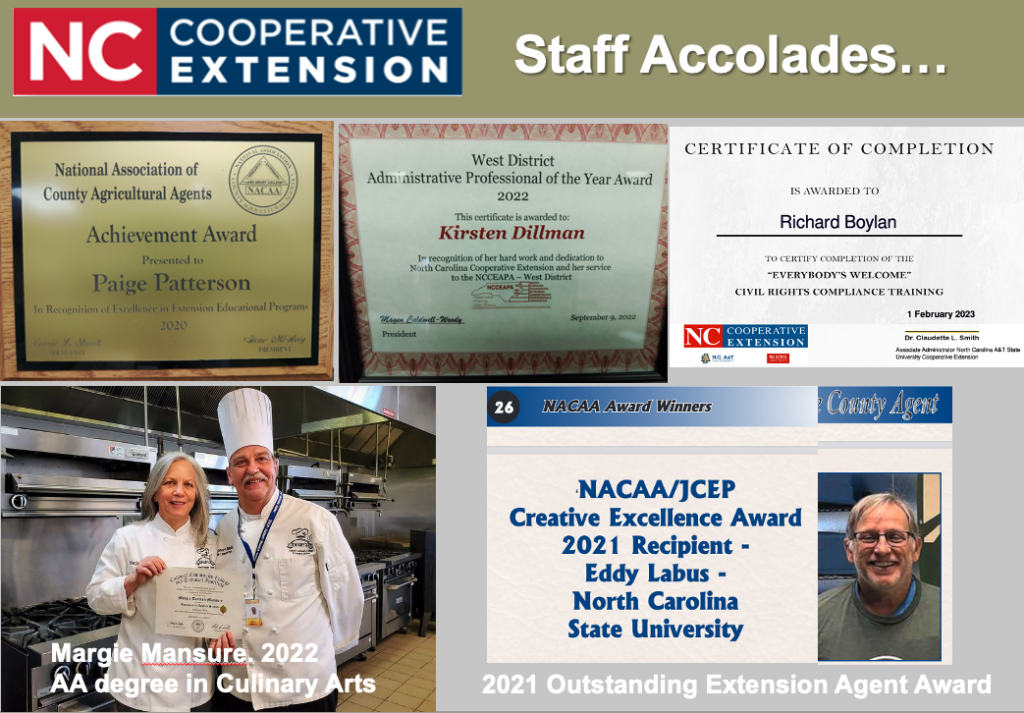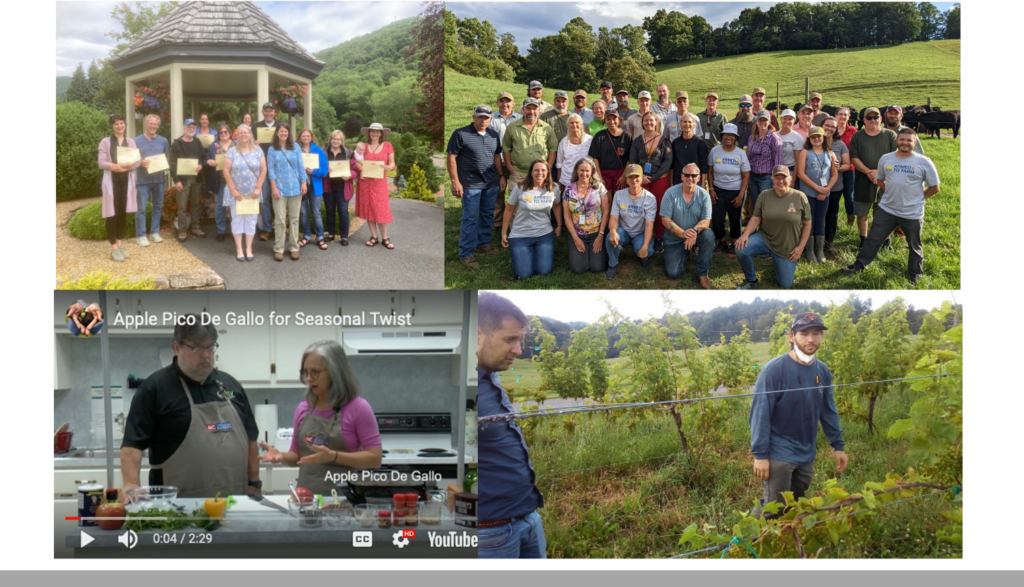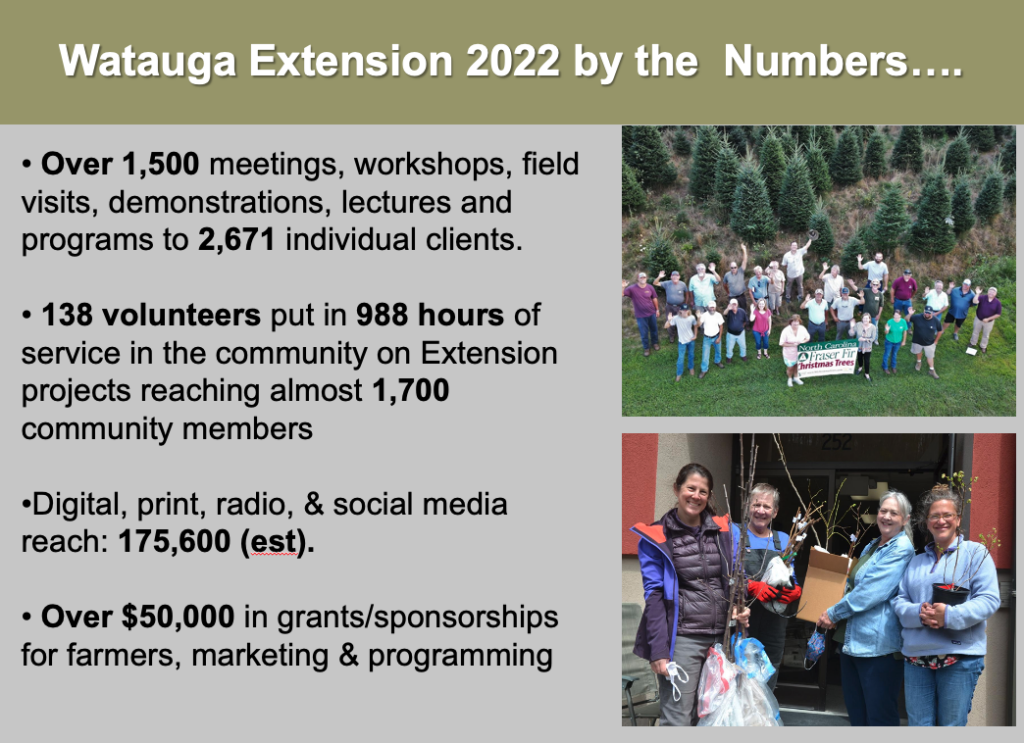Watauga Extension’s 2023 Report to the People
go.ncsu.edu/readext?923994
en Español / em Português
El inglés es el idioma de control de esta página. En la medida en que haya algún conflicto entre la traducción al inglés y la traducción, el inglés prevalece.
Al hacer clic en el enlace de traducción se activa un servicio de traducción gratuito para convertir la página al español. Al igual que con cualquier traducción por Internet, la conversión no es sensible al contexto y puede que no traduzca el texto en su significado original. NC State Extension no garantiza la exactitud del texto traducido. Por favor, tenga en cuenta que algunas aplicaciones y/o servicios pueden no funcionar como se espera cuando se traducen.
Português
Inglês é o idioma de controle desta página. Na medida que haja algum conflito entre o texto original em Inglês e a tradução, o Inglês prevalece.
Ao clicar no link de tradução, um serviço gratuito de tradução será ativado para converter a página para o Português. Como em qualquer tradução pela internet, a conversão não é sensivel ao contexto e pode não ocorrer a tradução para o significado orginal. O serviço de Extensão da Carolina do Norte (NC State Extension) não garante a exatidão do texto traduzido. Por favor, observe que algumas funções ou serviços podem não funcionar como esperado após a tradução.
English
English is the controlling language of this page. To the extent there is any conflict between the English text and the translation, English controls.
Clicking on the translation link activates a free translation service to convert the page to Spanish. As with any Internet translation, the conversion is not context-sensitive and may not translate the text to its original meaning. NC State Extension does not guarantee the accuracy of the translated text. Please note that some applications and/or services may not function as expected when translated.
Collapse ▲On Tuesday, March 14, Watauga Extension presented their annual Report to the People to citizens and partners from various agencies and departments in the county. While heavy morning snow kept some attendees from driving in for the meeting, those who attended were treated to a home-cooked lunch prepared by FCS Agent Margie Mansure featuring locally sourced beef and vegetables. Agencies and organizations in attendance included Blue Ridge Conservancy, the Watauga County Cattlemen’s Association, Extension Master Gardener℠ volunteers, Blue Ridge Women in Agriculture & the High Country Food Hub, Farm Bureau, Soil & Water, Appalachian State University, the Town of Boone, and the Watauga County Manager and Commissioners. Following lunch, Extension Director Jim Hamilton provided a snapshot of the N.C. Cooperative Extension, Watauga County Center’s efforts from the prior year and initiatives that the county center is focusing on for 2023 and beyond. Hamilton mentioned that funding is being requested for a 4-H agent this year, due to renewed interest and a brand new 4-H club having just chartered in the county. He also highlighted the ‘Kill-Chill’ meat slaughter facility as a major public-private project for which $2.4 million in funding has been raised for thus far. This project would greatly improve economic capacity for the region’s commercial meat producers.
This was the first ‘in-person’ Report to the People since March of 2020, just before the pandemic. Hamilton used the opportunity to publicly recognize Agents and staff who received state and national recognition over the last two years for their accomplishments to the University, the community, and to our region.

Since 2020, several agents and staff received state and national awards for their achievements and programming efforts
Following Hamilton’s overview of past and current activities and initiatives, each Extension Agent highlighted priority areas for programming. Livestock Agent Eddy Labus discussed his work with livestock producers on forage production & pasture enhancement as well as his collaboration with Appalachian State University’s Frontline to Farm training for Veterans interested in farming. Margie Mansure, Watauga’s Nutrition and Local Food Agent highlighted her efforts in connecting consumers to local farms and products by offering cooking classes and demonstrations at Farmer’s Markets and will be developing a Master Food Volunteer program in 2023. Richard Boylan reviewed the technical production and food safety training that he carried out at workshops and individual farms, including a number of vineyards in the county. Paige Patterson discussed the many volunteer hours her Master Gardeners contributed to community projects and her role assisting the Christmas tree & commercial landscaping industries.

Watauga Extension graduated 16 new Master Gardeners, assisted Veterans interested in becoming farmers, produced cooking videos, and worked with many individual farms in 2022.
An important consideration brought up during the meeting is that Watauga County ranked in the top 40 counties nationally in potential future loss of farmland. A comparison between 2012 and 2017 county agricultural data compiled from the NCDA and USDA farm census showed a decrease in the number of farms and in the acreage of farmland in the county. While sobering, this data reinforces the mission of Cooperative Extension to provide producers the best information and technical guidance to ensure that farm, farming, and open land continues to be available for not only production, but for the aesthetic that defines Watauga County.





